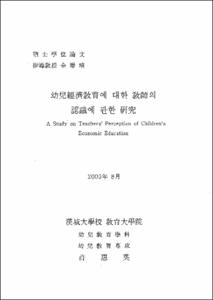유아경제교육에 대한 교사의 인식에 관한 연구
- Files in This Item:
-
-
Download
 000000556987.pdf
기타 데이터 / 2.11 MB / Adobe PDF
000000556987.pdf
기타 데이터 / 2.11 MB / Adobe PDF
-
Items in Repository are protected by copyright, with all rights reserved, unless otherwise indicated.
 000000556987.pdf
기타 데이터 / 2.11 MB / Adobe PDF
000000556987.pdf
기타 데이터 / 2.11 MB / Adobe PDFItems in Repository are protected by copyright, with all rights reserved, unless otherwise indicated.